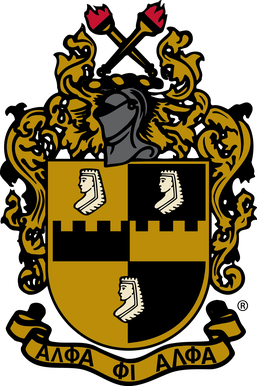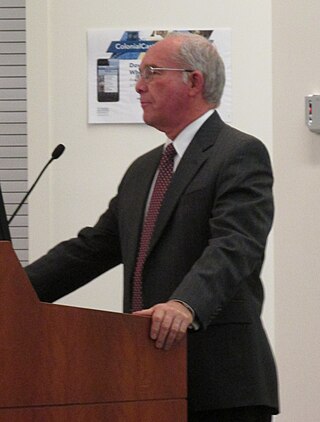Related Research Articles

The Princeton School of Public and International Affairs is a professional public policy school at Princeton University. The school provides an array of comprehensive coursework in the fields of international development, foreign policy, science and technology, and economics and finance through its undergraduate (AB) degrees, graduate Master of Public Affairs (MPA), Master of Public Policy (MPP), and PhD degrees.

Louis Wade Sullivan is an active health policy leader, minority health advocate, author, physician, and educator. He served as the Secretary of the United States Department of Health and Human Services during President George H. W. Bush's Administration and was Founding Dean of the Morehouse School of Medicine.

Joseph Samuel Nye Jr. is an American political scientist. He and Robert Keohane co-founded the international relations theory of neoliberalism, which they developed in their 1977 book Power and Interdependence. Together with Keohane, he developed the concepts of asymmetrical and complex interdependence. They also explored transnational relations and world politics in an edited volume in the 1970s. More recently, he pioneered the theory of soft power. His notion of "smart power" became popular with the use of this phrase by members of the Clinton Administration and the Obama Administration.

Howard Eliot Wolpe was an American politician who served as a seven-term U.S. Representative from Michigan and Presidential Special Envoy to the African Great Lakes Region in the Clinton Administration, where he led the United States delegation to the Arusha and Lusaka peace talks, which aimed to end civil wars in Burundi and the Democratic Republic of the Congo. He returned to the U.S. State Department as Special Advisor to the Secretary for Africa's Great Lakes Region. Previously, he had served as Director of the Africa Program at the Woodrow Wilson International Center for Scholars, and of the Center's Project on Leadership and Building State Capacity. While at the Center, Wolpe directed post-conflict leadership training programs in Burundi, the Democratic Republic of the Congo and Liberia.

Alpha Phi Alpha Fraternity, Inc. (ΑΦΑ) is the oldest intercollegiate historically African American fraternity. It was initially a literary and social studies club organized in the 1905–1906 school year at Cornell University but later evolved into a fraternity with a founding date of December 4, 1906. It employs an icon from Ancient Egypt, the Great Sphinx of Giza, as its symbol. Its aims or pillars are "Manly Deeds, Scholarship, and Love For All Mankind," and its motto is "First of All, Servants of All, We Shall Transcend All." Its archives are preserved at the Moorland-Spingarn Research Center.

Africare is a non-profit organization based in Washington, D.C., which provides development aid for Africa. It was founded by Dr. Joseph Kennedy and C. Payne Lucas in 1970, former Peace Corps members who worked in eastern Niger. Africare is the largest and oldest African-American founded international NGO focused exclusively on the continent of Africa. Since 1970, Africare has been improving lives and building a better future by partnering with local communities, focusing on agriculture and food security, healthcare, maternal and child health, HIV/AIDS, access to potable water, and women's empowerment. In more than 40 years of building partnerships with local communities, NGOs, governments and the private sector, Africare has invested over $1 billion in more than 35 countries in Sub-Saharan Africa.

Edward William Gnehm Jr., also known as Skip Gnehm, is an American diplomat who most recently served as the U.S. ambassador to Jordan. He is now a faculty member at George Washington University's Elliott School of International Affairs.

Donald Boyd Easum was an American diplomat.

Johnnetta Betsch Cole is an American anthropologist, educator, museum director, and college president. Cole was the first female African-American president of Spelman College, a historically black college, serving from 1987 to 1997. She was president of Bennett College from 2002 to 2007. During 2009–2017 she was Director of the Smithsonian Institution's National Museum of African Art. Cole served as the national chair and 7th president for the National Council of Negro Women from 2018 to 2022.

Michael Lucius Lomax is an American educator and former elected official who has served as president and chief executive officer of the United Negro College Fund since 2004. From 1997 to 2004, he served as president of Dillard University, a historically Black university (HBCU). Lomax was elected as a member and then chairman of the Fulton County Board of Commissioners, the first African American elected official in history to lead a major county government in the State of Georgia.
David Ernest Apter was an American political scientist and sociologist. He was Henry J. Heinz Professor of Comparative Political and Social Development and senior research scientist at Yale University.

James Alfred Joseph was an American diplomat.
Robert Michael Franklin Jr. is an American author, theologian, ordained minister, and academic administrator who served as the tenth president of Morehouse College from 2007 to 2012. Franklin is a visiting scholar in residence at Stanford University's Martin Luther King Jr. Research and Education Institute. In January 2014, he became director of the religion program at the Chautauqua Institution.
Walter C. Carrington was an American diplomat who served as the United States Ambassador Extraordinary and Plenipotentiary to Senegal and Nigeria.
The World Policy Council of Alpha Phi Alpha fraternity is a nonprofit and nonpartisan think tank established in 1996 at Howard University to expand the fraternity's involvement in politics and social and current policy to encompass important global and world issues. They describe their mission as to "address issues of concern to our brotherhood, our communities, our Nation, and the world."

Senegal–United States relations are bilateral relations between Senegal and the United States.
Moses William Howard, Jr. is an American cleric, former college president, community and business leader. He is known for his involvement in ecumenical organizations domestically and internationally and in international affairs, especially within the Middle East and Southern Africa. He is the son of the late Laura Turner Howard and the late Moses William Howard, Sr. He attended public schools in Americus before enrolling in Morehouse College, where he graduated in 1968. He earned a Master of Divinity degree at Princeton Theological Seminary in 1972. His worldview was shaped initially in response to the racial segregation he experienced in his hometown, where he participated in voter registration drives in the early 1960s. He studied Philosophy and Psychology at Morehouse and was heavily influenced by Professors Samuel Woodrow Williams and Lucius M. Tobin. His principal academic advisor at Princeton was Professor Edward Jabra Jurgi.

Earl Anthony Wayne is an American diplomat. Formerly Assistant Secretary of State for Economic and Business Affairs, Ambassador to Argentina and Deputy Ambassador to Afghanistan, Wayne served nearly four years as Ambassador to Mexico. He was nominated by President Obama and confirmed by the Senate in August, 2011. He departed Mexico City for Washington July 31, 2015 and retired from the State Department on September 30, 2015. Wayne attained the highest rank in the U.S. diplomatic service: Career Ambassador. He is currently a Professorial Lecturer and Distinguished Diplomat in Residence at American University's School of International Service where he teaches courses related to diplomacy and US foreign policy. Wayne also works with the Woodrow Wilson International Center for Scholars, the Atlantic Council, the Center for Strategic and International Studies,. Wayne is co-chair of the Mexico Institute's Advisory Board at the Wilson Center. He is also on the board of the American Academy of Diplomacy and the Public Diplomacy Council of America. Wayne is an independent consultant, speaker and writer and works with several not-for-profit professional associations. He was an adviser for HSBC Latin America on improving management of financial crime risk from 2015 until 2019 and served on the board of the American Foreign Service Association from 2017 to 2019.
African-Americans in foreign policy in the United States catalogs distinguished African Americans who have and continue to contribute to international development, diplomacy, and defense through their work with the U.S. Department of State, the U.S. Agency for International Development, the U.S. Information Agency, and the U.S. Congress, and other notable agencies and non-governmental organizations. The creators acknowledge the presence of the interagency contributions to the foreign affairs realm, and welcome additional content to showcase the achievements of African-Americans in other relevant USG agencies.
References
- 1 2 "Graduate Alumni Records, 1960-1989". Princeton University Archives. Retrieved March 18, 2022.
- Africare Welcomes As Its New President, Julius E. Coles
- Coles, Julius E. Monday, August 8, 2005. "Bush's Role in Africa". Washington Post, Page A15.